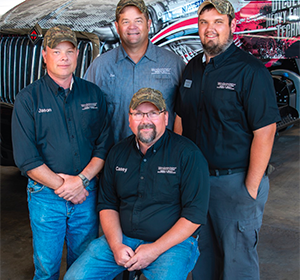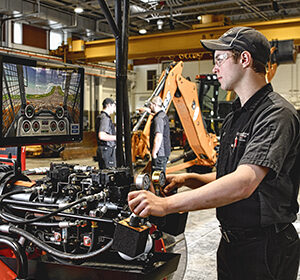More Than Mechanics:
The Heart of Western’s Diesel Program
At Western Technical College, the Diesel and Heavy Equipment program is about more than just engines and transmissions; it’s a community where students and instructors form bonds that last a lifetime. Guided by dedicated educators like Casey Eglinton and his fellow instructors—Cody Bork, Jason Lewis, and Chad Hofslien—this program thrives on inclusivity, collaboration, and a full commitment to supporting one another.

For the Diesel team, teaching isn’t just about sharing knowledge; it’s about creating an environment where every student feels valued. “We’re all on the same team here,” Casey says. “Our goal is for students to learn, have fun, make friends, and leave this program ready to contribute to the world.” This approach is rooted in enthusiasm and mutual respect. Casey learned early on that positive energy and encouragement go much further than a heavy hand. The influence of mentors like Duane Yachwak, who emphasized treating students as people first, continues to guide the entire team. The strength of this philosophy comes from a united front of instructors who each bring their own expertise and passion to the program.
The success of the Diesel program is a testament to the collective efforts of all its instructors. “We’ve got Cody on engines, Jason on powertrains, Chad on heavy equipment, and me, Casey, on electrical,” Casey says. “Together, we make a great team, and we are very, very good at what we do.” But it’s not just about technical expertise. Casey, Cody, Jason, and Chad have cultivated a culture where students feel—and actually are—integral. “We don’t show up with our work uniforms perfectly pressed or our pocket protectors full of pens,” Casey jokes. “We’re not perfect, but we know what our students need to succeed—and we strive to give them that every day.”
In the Diesel and Heavy Equipment program, teaching goes far beyond the classroom. The instructors are deeply connected to their students, and instinctively notice when something’s off. This daily interaction builds an environment where learning isn’t just about acquiring knowledge—it’s about belonging—and how these factors are linked to each other. When fellow instructor Cody Bork was a Diesel student, he noticed that his instructor at the time, Casey was struggling with personal issues and reached out to offer help. It reflected the culture they had built together—one where everyone looks out for each other. This kind of mutual care and openness is what makes the Diesel program so special.
Success in the Diesel program isn’t just about mastering technical skills; it’s about problem-solving, critical thinking, and being a reliable team player. Every instructor emphasizes starting with the basics—learning by the book—and then developing your own methods as you gain experience. But beyond these technical skills, the program instills values of cooperation and respect—qualities just as vital in the workshop as they are in life. It’s this blend of expertise and personal growth that prepares students for success in the industry.
The culture in the Diesel program is one of camaraderie, inclusivity, and genuine care. From day one, students are encouraged to be themselves, share their struggles, and support one another. “You might be sitting next to your new best friend,” Casey tells his students. And for many, that’s exactly what happens. These connections often extend beyond graduation. Former students attend each other’s weddings, become godparents, and remain close long after they leave Western. “We’re not classmates, we’re family,” says former student Corey Clark, capturing the program’s spirit of unity.

The relationships formed in the Diesel program have a lasting impact, providing students with confidence and support throughout their lives. One example is Gage Guillaume, a former student who went above and beyond to help a current student in crisis. When a current student, found herself dealing with frozen pipes under her trailer home during a brutal cold snap, she was overwhelmed. Not knowing what to do, she mentioned it to one of the instructors. That’s when Gage, who owns and operates G&S Equipment in Black River Falls WI, stepped in. He didn’t hesitate to offer his help. Gage drove out to her home, equipped with heaters, insulation, and the know-how to get the job done.
But Gage didn’t stop there. After thawing the pipes and wrapping them with heat tape to prevent future freezing, he noticed that the student in need and her kids needed more than just a quick fix. He went out of his way to pick up groceries and supplies to make sure they had everything they needed to get through the cold spell comfortably. Gage’s generosity and care were a lifeline for her, showing just how strong the bonds formed in the Diesel program can be.
This sense of community extends well beyond the classroom. Graduates often become active members of local organizations, like volunteer firefighters or Lions Club members. The Diesel instructors lead by example, showing students the importance of giving back. Western’s Diesel program is more than just an education; it’s a crucial part of the local community. The program acts as a “graduate mill,” producing professionals who are not only technically proficient but also deeply connected to their community. One student working at Allstate Peterbilt in West Salem found that everyone in the shop had either been a Western Diesel student or worked with one of the instructors. This network of alumni continues to support and uplift each other long after they’ve left the classroom.
The Diesel program’s impact is further amplified by support from the Foundation and scholarships, which are essential for many students. Initiatives like the Cavalier Cupboard ensure that no student must choose between their education and a meal.
The story of Gage Guillaume, stepping up to help a fellow student in need is just one example of the generosity and care that define this program. Truth is, it’s one of many stories that highlight the power of this close-knit community. “I truly believe that nine out of ten students in this program would do the same if asked,” Casey says. It’s stories like these that illustrate the deep bonds and sense of responsibility that make Western’s Diesel program more than just a place to learn—it’s a place to belong.
